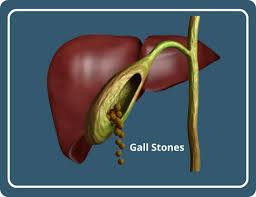Gallstones are hardened deposits that form in the gallbladder, a small organ located just below the liver. They can vary in size from as small as a grain of sand to as large as a golf ball. Gallstones form when there is an imbalance in the substances that make up bile, a fluid produced by the liver to aid in digestion. There are several factors that can contribute to the formation of gallstones:
-
Excess Cholesterol: One of the most common types of gallstones forms when there's too much cholesterol in the bile. If the liver excretes more cholesterol than the bile can dissolve, it can lead to the formation of cholesterol stones.
-
Bilirubin Imbalance: Bilirubin is a waste product produced when the liver breaks down old red blood cells. If there's too much bilirubin in the bile, it can contribute to the formation of pigment stones.
-
Slow Gallbladder Emptying: If the gallbladder doesn't empty completely or often enough, bile may become concentrated, increasing the risk of gallstone formation.
-
Other Factors: Other factors that may increase the risk of gallstones include obesity, rapid weight loss, a diet high in fat or cholesterol, certain medical conditions such as diabetes, liver disease, or certain blood disorders, and a family history of gallstones.
Consult with Dr. Susenjit Prasad Mahato , the best gallbladder surgeon in Kolkata, for the complete cure of your gallbladder stone issue.

